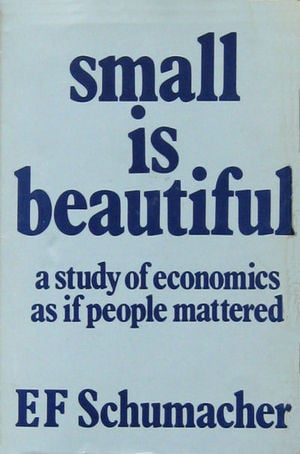
Small Is Beautiful: Economics As If People Mattered is a collection of essays by British economist E. F. Schumacher. The phrase "Small Is Beautiful" came from a phrase by his teacher Leopold KohrW.[1] It is often used to champion small, appropriate technologies that are believed to empower people more, in contrast with phrases such as "bigger is better".
First published in 1973, Small Is Beautiful brought Schumacher's critiques of Western economics to a wider audience during the 1973 energy crisisW and emergence of globalizationW. The Times Literary SupplementW ranked Small Is Beautiful among the 100 most influential books published since World War IIW.[2] A further edition with commentaries was published in 1999.[3]
Small Is Beautiful received the prestigious award Prix Européen de l'Essai Charles Veillon in 1976.
Author[edit | edit source]
Schumacher was a respected economist who worked with John Maynard KeynesW and John Kenneth GalbraithW, and for twenty years as the Chief Economic Advisor to the National Coal BoardW in the United KingdomW. He was opposed to the tenets of neo-classical economicsW, declaring that single-minded concentration on outputW and technologyW was dehumanizingW. He held that one's workplace should be dignified and meaningful first, efficient second, and that nature (like its natural resources) is priceless.
Schumacher proposed the idea of "smallness within bigness": a specific form of decentralizationW. For a large organization to work, according to Schumacher, it must behave like a related group of small organizations. Schumacher's work coincided with the growth of ecologicalW concerns and with the birth of environmentalismW and he became a hero to many in the environmental movementW.
Content[edit | edit source]
The book is divided into four parts: "The Modern World," "Resources," "The Third World," and "Organization and Ownership."
In the first chapter, "The Problem of Production", Schumacher argues that the modern economyW is unsustainable. Natural resourcesW (like fossil fuelsW), are treated as expendable incomeW, when in fact they should be treated as capitalW, since they are not renewable, and thus subject to eventual depletion. He further argues that nature's resistance to pollution is limited as well. He concludes that government effort must be concentrated on sustainable development, because relatively minor improvements, for example, technology transferW to Third WorldW countries, will not solve the underlying problem of an unsustainable economy.
Schumacher's philosophy is one of "enoughness," appreciating both human needs, limitations and appropriate use of technology. It grew out of his study of village-based economics, which he later termed "Buddhist economicsW," which is the subject of the book's fourth chapter.
He faults conventional economic thinking for failing to consider the most appropriate scale for an activity, blasts notions that "growth is good," and that "bigger is better," and questions the appropriateness of using mass production in developing countries, promoting instead "production by the masses." Schumacher was one of the first economists to question the appropriateness of using gross national productW to measure human well being, emphasizing that "the aim ought to be to obtain the maximum amount of well being with the minimum amount of consumption."
Quotes[edit | edit source]
- Man is small, and, therefore, small is beautiful.
- A Buddhist economist would consider this approach excessively irrational: since consumption is merely a means to human well-being, the aim should be to obtain the maximum of well-being with the minimum of consumption.... The less toil there is, the more time and strength is left for artistic creativity. Modern economics, on the other hand, considers consumption to be the sole end and purpose of all economic activity.
- It is clear, therefore, that Buddhist economics must be very different from the economics of modern materialism, since the Buddhist sees the essence of civilisation not in a multiplication of wants but in the purification of human character. Character, at the same time, is formed primarily by a man's work. And work, properly conducted in conditions of human dignity and freedom, blesses those who do it and equally their products.
- The most striking thing about modern industry is that it requires so much and accomplishes so little. Modern industry seems to be inefficient to a degree that surpasses one's ordinary powers of imagination. Its inefficiency therefore remains unnoticed.
- Wisdom demands a new orientation of science and technology towards the organic, the gentle, the non-violent, the elegant and beautiful.
- The way in which we experience and interpret the world obviously depends very much indeed on the kind of ideas that fill our minds. If they are mainly small, weak, superficial, and incoherent, life will appear insipid, uninteresting, petty, and chaotic.
See also[edit | edit source]
- A Guide for the Perplexed
- Simple living
- Appropriate Technology
- E. F. Schumacher on Appropriate Technology
References[edit | edit source]
- ↑ Dr. Leopold Kohr, 84; Backed Smaller States, New York Times obituary, 28 February 1994.
- ↑ The Times Literary Supplement, October 6, 1995, p. 39
- ↑ Schumacher, E. F.; Small Is Beautiful: Economics As If People Mattered : 25 Years Later...With Commentaries (1999). Hartley & Marks Publishers ISBN 0-88179-169-5
External links[edit | edit source]
- The Schumacher Institute for Sustainable Systems home page
- Multiple translations of the essay Buddhist Economics from the E. F. Schumacher Society
- Small Is Beautiful: An Introduction to E. F. Schumacher by Noah Enelow
- "Sustainability / Enoughness" from Project Worldview
- Fifty Possible Ways to Challenge Over-Commercialism
- Beyond Simplicity: Tough Issues For A New Era by Albert J. Fritsch, SJ, PhD